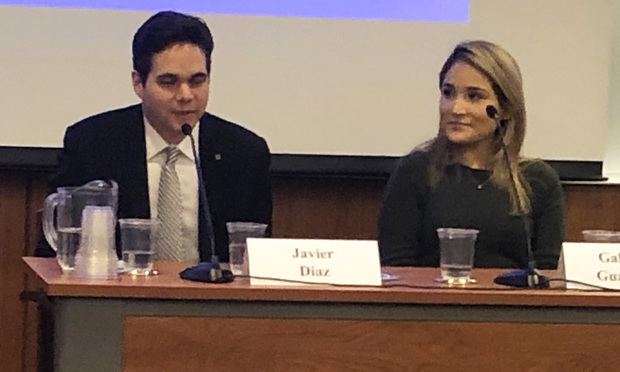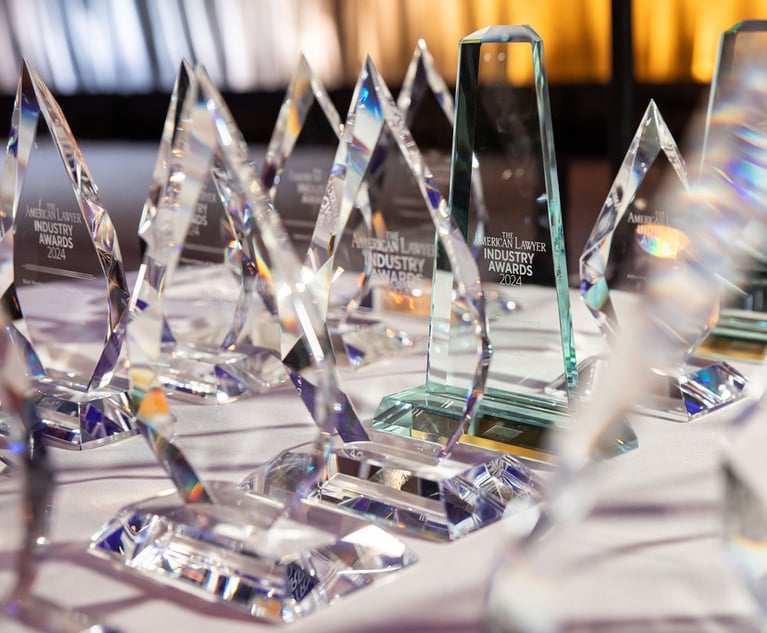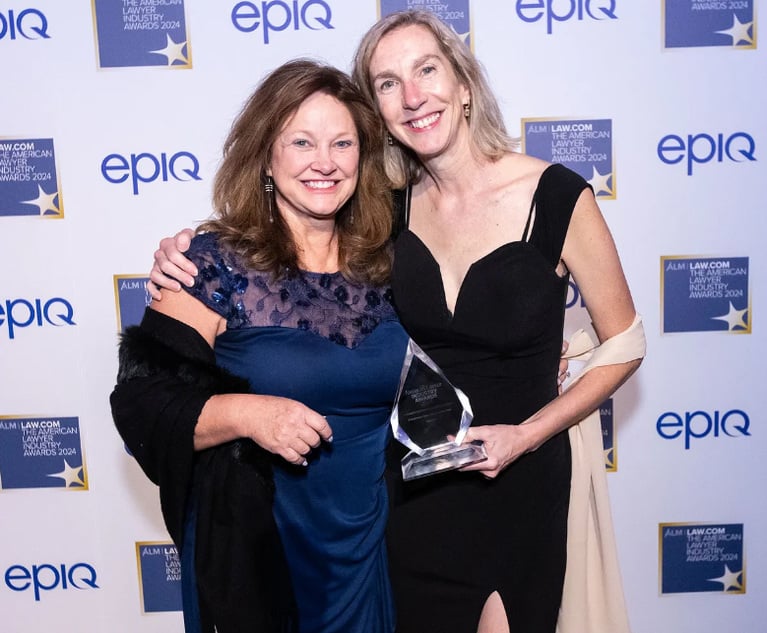Internet Expansion Has Made Brand Protection Increasingly Difficult for Fashion Attorneys
"The internet is the problem," Javier Diaz, associate general counsel at Chanel, quipped at the symposium. "It is harder and harder to distinguish an authentic product from a counterfeit these days."
February 21, 2020 at 05:10 PM
3 minute read
 Javier Diaz, associate general counsel at Chanel Inc., and Gabriela Guaracao, CEO and founder of Americae, at Villanova University Charles Widger School of Law's sixth annual Fashion Law Symposium on Feb. 21, 2020.
Javier Diaz, associate general counsel at Chanel Inc., and Gabriela Guaracao, CEO and founder of Americae, at Villanova University Charles Widger School of Law's sixth annual Fashion Law Symposium on Feb. 21, 2020.
Speaking at Villanova University Charles Widger School of Law's sixth annual Fashion Law Symposium on Friday in Pennsylvania, Javier Diaz, associate general counsel of internet enforcement at Chanel Inc., said the expansion of the internet has made it easier for people to become involved in counterfeiting products and makes brand protection more difficult.
"The internet is the problem," Diaz quipped at the symposium. "It is harder and harder to distinguish an authentic product from a counterfeit these days."
Based in New York, Diaz said the legal department at Chanel has to make a concerted effort to coordinate with their international partners and take concise action against counterfeiters. However, because counterfeiters can shut themselves down as quickly as they pop up, that effort can be difficult.
"Our resources are very limited in the extent that we only have offices in so many places," Diaz explained.
Further, not all counterfeiters have large factories in different parts of the world. With access to the internet expanding, Diaz said some counterfeiters are akin to mom-and-pop shops and are difficult to trace.
Diaz said Chanel's legal team tries to litigate the counterfeiters but also sends out notices and takedown demands to online retailers found to have been selling counterfeit goods.
Apart from wanting to protect the company from having its name on counterfeit goods, Diaz said Chanel wants to protect its customers. He said even counterfeit clothing and accessory products may not be safe and mentioned reports through the years of counterfeit jewelry having high levels of lead.
"At the end of the day not only do we want to protect our brand, but we want to make sure [consumers] don't get sick," Diaz said. "It is a motivating factor for us to keep our clients safe."
Philadelphia-based Gabriela Guaracao, CEO and founder of Americae, said it is important to teach the consumer the value of what they are buying to help combat the purchase of counterfeit goods. She said because of the internet consumers are more aware than they have been in the past about sourcing and how products are being made and that she often travels to factory sites to answer these kinds of questions.
"How is it made? Is it funding organized crime? That is something we as a young brand are doing now," Guaracao said.
To further combat bad practices, Diaz said many companies in fashion are bringing more work in-house.
"It is an industrywide trend and Chanel realized it would be more cost-effective and also, from a consumer protection standpoint, they know where all of the products are coming from and be in more control of the process," Diaz said.
This content has been archived. It is available through our partners, LexisNexis® and Bloomberg Law.
To view this content, please continue to their sites.
Not a Lexis Subscriber?
Subscribe Now
Not a Bloomberg Law Subscriber?
Subscribe Now
NOT FOR REPRINT
© 2025 ALM Global, LLC, All Rights Reserved. Request academic re-use from www.copyright.com. All other uses, submit a request to [email protected]. For more information visit Asset & Logo Licensing.
You Might Like
View All
'True Leadership Is About Putting Others First': 2024 In-House Award Winners Inspired, Took Road Less Traveled


Datasite's Ethics and Compliance Team Drives Transformation
Trending Stories
- 1Reviewing Judge Merchan's Unconditional Discharge
- 2With New Civil Jury Selection Rule, Litigants Should Carefully Weigh Waiver Risks
- 3Young Lawyers Become Old(er) Lawyers
- 4Caught In the In Between: A Legal Roadmap for the Sandwich Generation
- 5Top 10 Developments, Lessons, and Reminders of 2024
Who Got The Work
J. Brugh Lower of Gibbons has entered an appearance for industrial equipment supplier Devco Corporation in a pending trademark infringement lawsuit. The suit, accusing the defendant of selling knock-off Graco products, was filed Dec. 18 in New Jersey District Court by Rivkin Radler on behalf of Graco Inc. and Graco Minnesota. The case, assigned to U.S. District Judge Zahid N. Quraishi, is 3:24-cv-11294, Graco Inc. et al v. Devco Corporation.
Who Got The Work
Rebecca Maller-Stein and Kent A. Yalowitz of Arnold & Porter Kaye Scholer have entered their appearances for Hanaco Venture Capital and its executives, Lior Prosor and David Frankel, in a pending securities lawsuit. The action, filed on Dec. 24 in New York Southern District Court by Zell, Aron & Co. on behalf of Goldeneye Advisors, accuses the defendants of negligently and fraudulently managing the plaintiff's $1 million investment. The case, assigned to U.S. District Judge Vernon S. Broderick, is 1:24-cv-09918, Goldeneye Advisors, LLC v. Hanaco Venture Capital, Ltd. et al.
Who Got The Work
Attorneys from A&O Shearman has stepped in as defense counsel for Toronto-Dominion Bank and other defendants in a pending securities class action. The suit, filed Dec. 11 in New York Southern District Court by Bleichmar Fonti & Auld, accuses the defendants of concealing the bank's 'pervasive' deficiencies in regards to its compliance with the Bank Secrecy Act and the quality of its anti-money laundering controls. The case, assigned to U.S. District Judge Arun Subramanian, is 1:24-cv-09445, Gonzalez v. The Toronto-Dominion Bank et al.
Who Got The Work
Crown Castle International, a Pennsylvania company providing shared communications infrastructure, has turned to Luke D. Wolf of Gordon Rees Scully Mansukhani to fend off a pending breach-of-contract lawsuit. The court action, filed Nov. 25 in Michigan Eastern District Court by Hooper Hathaway PC on behalf of The Town Residences LLC, accuses Crown Castle of failing to transfer approximately $30,000 in utility payments from T-Mobile in breach of a roof-top lease and assignment agreement. The case, assigned to U.S. District Judge Susan K. Declercq, is 2:24-cv-13131, The Town Residences LLC v. T-Mobile US, Inc. et al.
Who Got The Work
Wilfred P. Coronato and Daniel M. Schwartz of McCarter & English have stepped in as defense counsel to Electrolux Home Products Inc. in a pending product liability lawsuit. The court action, filed Nov. 26 in New York Eastern District Court by Poulos Lopiccolo PC and Nagel Rice LLP on behalf of David Stern, alleges that the defendant's refrigerators’ drawers and shelving repeatedly break and fall apart within months after purchase. The case, assigned to U.S. District Judge Joan M. Azrack, is 2:24-cv-08204, Stern v. Electrolux Home Products, Inc.
Featured Firms
Law Offices of Gary Martin Hays & Associates, P.C.
(470) 294-1674
Law Offices of Mark E. Salomone
(857) 444-6468
Smith & Hassler
(713) 739-1250







